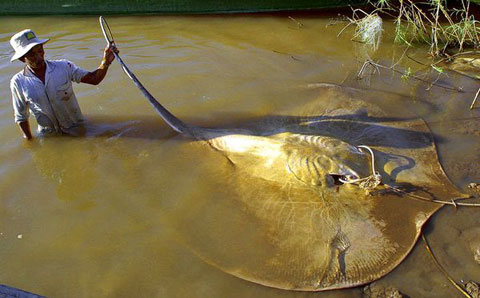Mekong sub-region focuses on green growth
Countries in the Mekong sub-region will invest in regional ecological infrastructure, to conserve biodiversity and maintain sustainability.
The government and civil society organizations of the six countries of the Greater Mekong Subregion (GMS) today held a seminar in Hanoi, to discuss how to achieve the goal of a prosperous and public area. more equal through green economic development.
'Investing in biodiversity conservation and natural resource conservation in the GMS region will bring many benefits, creating more options for economic growth, protecting society from natural disasters and ensuring Long-term sustainability against global environmental changes , ' said Dr. Geoffrey Blate, WWF Greater Mekong's Landscape Conservation Advisor.
According to experts, the Mekong sub-region is one of the highest biodiversity values in the world. Few places on earth where the fundamental links between people and ecosystem wealth are manifest as this area.
About 80% of the population depends on the production of natural ecosystems such as clean water, food and fiber.

Human impacts are making precious fish in the river
The Mekong is heavily affected by the changing living environment. (Photo: AP)
The Greater Mekong Sub-region (GMS) is a natural economic area that surrounds the Mekong River, with an area of 2.6 million square kilometers and about 326 million people.
However, Dr. Nguyen Van Tai, director of the Institute of Natural Resources and Environment Policy Strategy, said that people are thoroughly exploiting the components and processes of the ecosystem in an impartial way to bring the benefits for them.
'Most people know the value of their home, car or work. But the value of the services that ecosystems bring is the problem we still have to learn, " Tai said.
At its July meeting, the Environment Ministers of the Greater Mekong Sub-region realized that the sub-region's economic development requires ecological infrastructure to be improved and managed. more effective to meet current needs as well as new demands for food, water and energy - are fundamental to future economic growth and regional prosperity.
'Action towards a green economy has placed the Mekong region's biodiversity in a central position and this transition is the biggest challenge of the next decade ,' added Dr Blate.
The workshop will take place tomorrow, experts will also look at models and collaborative opportunities to enhance support and encourage sustainable investment in the region.
With a vision towards the United Nations Conference on Sustainable Development Rio +20 in Brazil in June next year, participants attended the 'Road to Rio' proposal . This roadmap will generalize the Green Development goal for the Greater Mekong sub-region.
- The risk of losing forest area in the Mekong sub-region
- China focuses on green growth
- Denmark helps Vietnam grow green
- Cooperation on green growth for sustainable development
- Ecological crisis threatens the Mekong sub-region
- Mekong subregion: the most important biological region on the planet
- Climate change threatens the Mekong region
- Discovered 163 new species in the Mekong region
- More than 87.3 million USD to overcome the disaster of Mekong River
- More new species discovered in the lower Mekong
- Find more than 1,000 new species in the Mekong Subregion
- The whole Mekong Delta is subsiding at a rate of nearly 2.5cm per year
 Is the magnetic North Pole shift dangerous to humanity?
Is the magnetic North Pole shift dangerous to humanity? Washington legalizes the recycling of human bodies into fertilizer
Washington legalizes the recycling of human bodies into fertilizer Lightning stone - the mysterious guest
Lightning stone - the mysterious guest Stunned by the mysterious sunset, strange appearance
Stunned by the mysterious sunset, strange appearance